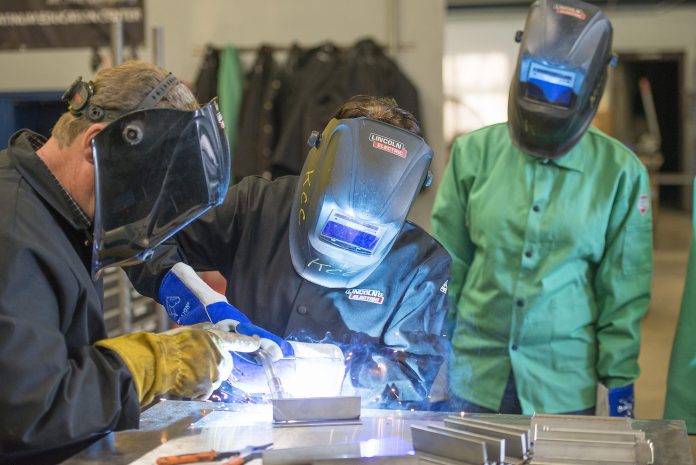After graduating high school some students don’t wish to continue traditional education. Traditional college education includes class lectures, homework and tests. Instead they may pursue a certification from a vocational school for a trade job. The Regional Manufacturing Technology Center (RMTC) provides these types of programs for Kellogg Community College students.
“A big part of choosing a career path is making sure that you pick something you’ll enjoy doing every day, something that gives you a sense of purpose and accomplishment. The trades aren’t for everyone, I just want to make sure that those who might be happy working in a trade are aware and at least consider the option,” KCC’s Interim Director of Industrial Trades Education Tom Longman said.
“Community colleges are a great place to learn a trade. KCC has reputable and accredited trades programs that are offered at its 50,000-square-foot RMTC. The RMTC is fully equipped with up-to-date real-world training equipment and staffed with experts possessing the knowledge and passion to help students succeed.”
The RMTC has many trades available for students to choose from. These classes help students learn skills that are needed in trades such as HVAC technicians, renewable energy technicians, machinists and electricians. Welding and electrical classes have high enrollment at the RMTC.
“Welding and electrical classes are the most popular, both have high enrollment. I think welding is popular because students think it’s cool and it’s very hands-on with not as much book work as some trades,” Longman said. “I think electrical is popular because people know how much money electricians can make after they complete an apprenticeship and become a journeyman. The average wage for a journeyman electrician is $28 per hour, with some International Brotherhood of Electrical Workers (IBEW) master electricians averaging $43 per hour.”
Aside from providing more options to hands-on learners, the RMTC allows students to complete their education in modules. The classes are also “open-entry.” This means that students are allowed to finish their module for the semester at their own pace.
“The flexibility of the modular format is very appealing to both students and employers who send and sponsor students for training. Being able to start classes at any time throughout the year makes it very convenient. So does being able to choose the days and times that work best for everyone’s busy life. It does however require somewhat more discipline than going to classes that have set days and times,” Longman said.
Being able to decide how quickly they want to finish a module gives the students the freedom to finish their certification earlier than the projected time.
“Program completion certificates are 25 to 30 credit hours, which equates to approximately 600 to 720 hours of training. How many hours a student is attending will determine how long it takes to complete a certificate. It could range from nine months to two years depending if the student is part time or full time,” Longman said.
Trade school gives students the option to expand their hands-on skills. The training the RMTC offers allows them to receive certifications in high-paying careers.
“It all boils down to what you are good at and what you will be happy doing. I discovered the machining/tool and die trade in high school and right away knew that it was what I wanted to do for a career,” Longman said. “It has been a rewarding path throughout the last 40 years working in a skilled trade that I love.”























